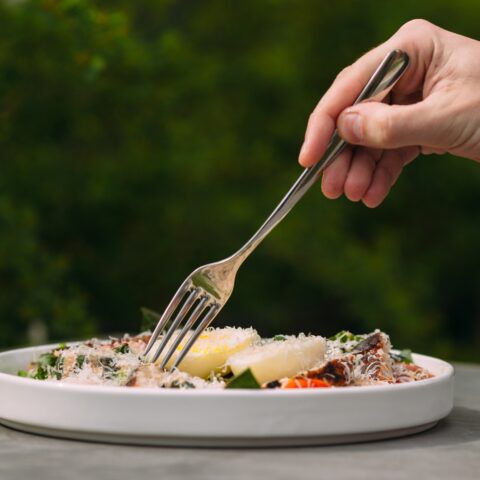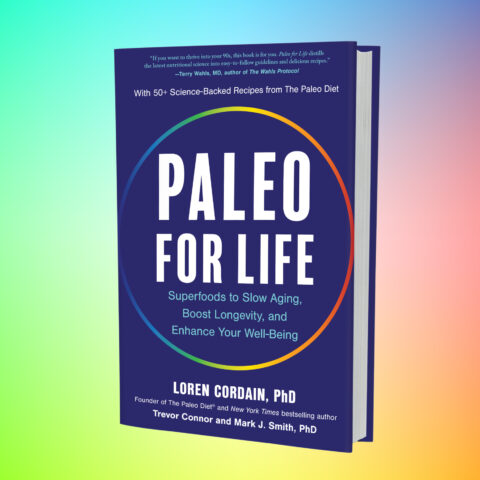Is a Vegetarian Diet Healthy?

Reviewed by Dr. Mark J. Smith on January 6, 2022
Low carb? High carb? Low fat? High fat?
Choosing a diet to follow can be an overwhelming and confusing experience. It’s hard to decipher which diet is best and why when we’re overloaded with contradicting information online.
There are lots of controversial questions in the nutritional world, and one of the biggest ones is whether eating meat is healthy for you.
Plant-based diets may be the health trend right now, but here’s why going this route may not be as healthy as you think.
Why Someone May Choose to Be Vegan or Vegetarian
The Paleo Diet® respects everyone’s choice to eat whichever diet works best for them! Some may choose to go vegan or vegetarian for religious, moral, or ethical reasons, and we support that. Choosing what’s best for you is always the best option—which is exactly why we want to help provide you with the knowledge you need to make that decision.
Our Hunter Gatherer Ancestors Were Not Vegetarian
The Paleo Diet is not a carnivore diet. In fact, by volume, The Paleo Diet can consist of more vegetables and fruit than meat. (That being said, we do encourage you to eat animal protein regularly!)
That’s because science supports that eating as closely to our Paleolithic ancestors as possible can reap great health benefits. That means eating a lot of vegetables, fruit, sustainably sourced meat and fish, eggs and some nuts and seeds.
It’s true, vegetarianism has deep historical roots, dating back to at least 500 BC within ancient Greece. (1) However, on an evolutionary timescale, this manner of eating has only been with us for a very short period—in comparison to the Paleolithic era dates back to approximately 2.5 million years ago. (2)
Going against the grain of the system that designed the way we are genetically adapted to has its downfalls. Long-term compliance to a vegan or vegetarian diet has been shown to cause nutritional deficiencies and health issues.
Is a Vegetarian Diet Healthy?
It’s no secret that, unless fortified, plant foods lack vitamin B12. Animal products are the only significant dietary source for this crucial vitamin. Vitamin B12 is responsible for forming red blood cells and DNA. It also plays a key role in the function and development of brain and nerve cells. (3)
Vitamin B12 can be taken as a supplement, but we believe any diet plan that requires supplementation should not be chosen for its health superiority. In other words, the food you eat should be providing you with all the nutrients you need!
That said, sometimes nutritional supplements are necessary. While our hunter-gatherer ancestors did not take dietary supplements, modern day living has changed the way we eat and behave. For instance, when we don’t spend the majority of our days outside, we may need a Vitamin D supplement.
A good rule of thumb to remember: supplements are supplemental to a high-quality diet—not in lieu of your diet. At The Paleo Diet, we believe in turning to food first and supplementation second.
As an essential vitamin, a B12 deficiency can wreak havoc on your body. Low B12 can cause the appearance of a toxic substance in our bloodstream known as homocysteine. Homocysteine increases the risk for infertility, birth defects, psychological illness, dementia, heart attacks, stroke and blood clots. (4, 5) These are just a few reasons why we think eating The Paleo Diet is the right choice!
How to Gently Transition to The Paleo Diet
If you have eaten a vegan or vegetarian diet for a long time, your body has adapted to know what it needs to digest your food, while simultaneously letting go of what it no longer needs—like proteases.
Proteases are digestive enzymes used to break down proteins and can be specific to animal proteins. Without the specific proteases, eating animal protein can be an uncomfortable experience if you don’t introduce meat into your diet slowly. But don’t worry, with patience and time, your body can begin to produce these enzymes again. Below are a few ways that you can integrate animal protein back into your diet.
1. Check in with yourself
Does the idea of adding meat into your diet cause you a great deal of anxiety or stress? Are you feeling shame and guilt for your decision to eat meat, but really want to honor your body’s cravings and need for animal protein? This is normal!
Be patient with yourself and work through these feelings at your own pace. An adjustment like this can bring up a lot of emotions and what you are experiencing is quite common. Give yourself some time and space to get clear on your comfort level. For example, will you be adding in one serving of meat at every meal? One meal per day? Or just one meal per week? Choose the option that feels right to you.
2. Try introducing one type of meat at a time
Pay close attention to how your body feels. Is your digestion improving? Your body needs time to process the new food you are eating. When you start with only one type of meat, you give your body the opportunity to communicate digestive upset, like bloating or gas. You also give yourself the chance to see what flavors you enjoy and which ones are totally off the table.
3. Relieve any discomfort with digestive enzymes and probiotics
If you don’t feel well after eating meat, consider trying digestive enzymes. These can help your body break down and absorb the proteins in meat and, thus, help counteract any unpleasant side effects.
You might also want to consider taking probiotics to help your gut flora catch up. Eat healthy probiotic foods like Salt-Free Sauerkraut or No-Salt Kimchi to give your body the beneficial bacteria it needs right now. You could also take supplements, but getting your probiotics from whole foods is always better.
4. Satisfy your cravings
After years without meat, your body may have specific cravings as it asks for certain nutrients. Allow yourself to enjoy whichever food it’s asking for. This helps repair any deficiencies you may have and teaches you about your body’s needs!
5. Sidestep the texture problem
If you aren’t comfortable with eating a piece of grilled chicken breast or baked salmon with your favorite salad quite yet, start small. Try using chicken broth instead of veggie broth in curries, soups, or chilis. You can also start adding meat to vegetarian recipes you already enjoy.
The Bottom Line
Choosing a diet that is best for you can be a complicated task, especially when deciding to eat meat or not. The Paleo Diet is the healthiest choice from a scientific standpoint, though we respect those that choose a different lifestyle for ethical reasons. If you decide to transition to The Paleo Diet, be gentle with yourself, playful in your recipe choices, and, most importantly, be patient. You’ve got this!
Resources:
1. Roe DA. History of promotion of vegetable cereal diets. J Nutr 1986;116:1355-1363.
2. Challa, H. J., Bandlamudi, M., & Uppaluri, K. R. (2021). Paleolithic Diet. In StatPearls [Internet]. StatPearls Publishing. 3. Vitamin B12. (2019, June 4). The Nutrition Source. https://www.hsph.harvard.edu/nutritionsource/vitamin-b12/
3. Institute of Medicine (US) Standing Committee on the Scientific Evaluation of Dietary Reference Intakes and its Panel on Folate, Other B Vitamins, and Choline. Dietary Reference Intakes for Thiamin, Riboflavin, Niacin, Vitamin B6, Folate, Vitamin B12, Pantothenic Acid, Biotin, and Choline. Washington (DC): National Academies Press (US); 1998. 9, Vitamin B12. https://www.ncbi.nlm.nih.gov/books/NBK114302/
4. Kumar, A., Palfrey, H. A., Pathak, R., Kadowitz, P. J., Gettys, T. W., & Murthy, S. N. (2017). The metabolism and significance of homocysteine in nutrition and health. Nutrition & Metabolism, 14, 78. https://doi.org/10.1186/s12986-017-0233-z
5. Del Bianco, A., Maruotti, G., Fulgieri, A. M., Celeste, T., Lombardi, L., Amato, N. A., & Pietropaolo, F. (2004). Recurrent spontaneous miscarriages and hyperhomocysteinemia. Minerva ginecologica, 56(5), 379–383. https://pubmed.ncbi.nlm.nih.gov/15531854/
Irene Jay
Irene Jay is a Holistic Health Coach and a certified Nutrition Coach from Vancouver, BC.
More About The Author




